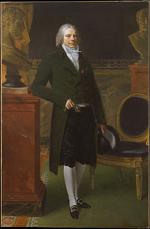Disable ads!
Charles Maurice de Talleyrand
Charles Maurice de Talleyrand-Périgord (/ˈtæləˌrænd ˈpɛrɪˌɡɔr/; French: [ʃaʁl moʁis də tal(ɛ)ʁɑ peʁiɡɔʁ]; 1754–1838), prince de Bénévent, then prince de Talleyrand, was a French bishop, politician and diplomat. Due to a lame leg, he was not able to start a military career as expected by his family. Instead, he studied theology. In 1780 he became Agent-General of the Clergy and represented the Catholic Church to the French Crown. He worked successfully at the highest level (usually as foreign minister or foreign deputy) for the regime of Louis XVI, through several governments of the French Revolution and then for Napoleon, Louis XVIII, Charles X, and Louis-Philippe. Most of them distrusted Talleyrand but, like Napoleon, found him indispensable. The name "Talleyrand" has become a synonym for crafty, cynical diplomacy. He was Napoleon's chief diplomatic aide in the conquest of Europe. Most of the time, however, he worked for peace so as to consolidate France's gains. He succeeded in obtaining peace with Austria in the 1801 Treaty of Luneville and with Britain in the 1802 Treaty of Amiens. He could not stop the renewal of war in 1803. By 1805 he opposed his emperor's renewed wars against Austria, Prussia, and Russia in 1805–1806; he resigned as foreign minister in August 1807 but Napoleon still trusted him. Talleyrand connived to undermine Napoleon's plans and secretly dealt with Tsar Alexander of Russia and the Austrian minister Metternich. He was seeking a negotiated secure peace so as to perpetuate the gains of the French revolution. But Napoleon rejected peace and when he fell in 1814 Talleyrand took charge of the Bourbon restoration based on the principle of legitimacy. He played a major role at the Congress of Vienna in 1814-1815, where he negotiated a favourable settlement for France while undoing Napoleon's conquests. Talleyrand polarizes scholarly opinion. Some regard him as one of the most versatile, skilled and influential diplomats in European history, and some believe that he was a traitor, betraying in turn, the Ancien Régime, the French Revolution, Napoleon, and the Restoration.
 Read more on wikipedia.org Read more on wikipedia.org
 All quotes by Charles Maurice de Talleyrand All quotes by Charles Maurice de Talleyrand
 Edit Edit
|

|
|
|
|
|
Background photo by Giuliana
|